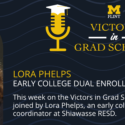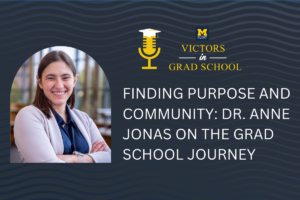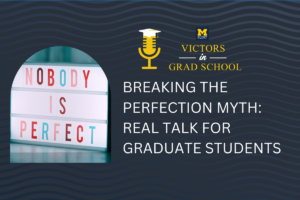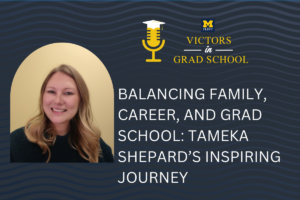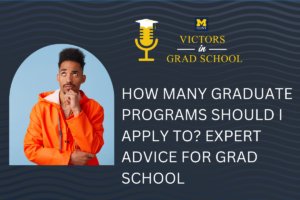Welcome to another exciting episode of the Victors in Grad School podcast! In this episode, our host, Dr. Christopher Lewis, sits down with a special guest, Lora Phelps, an early college dual enrollment coordinator. Lora shares her journey from undergraduate to graduate school, discussing the pivotal moments and decisions that led her to pursue further education. As someone who worked full-time while pursuing her graduate degree, Lora provides valuable insights on how to set oneself up for success and maintain that success throughout the demanding graduate school journey. Tune in to this episode to gain valuable tips and inspiration for your own path in academia.
This podcast is brought to you by The Office of Graduate Programs at the University of Michigan-Flint. If you’re still wondering about other things to consider when it comes to graduate school, you can also contact the Office of Graduate Programs at UM-Flint. We’re here to answer questions Monday – Friday from 8:00 a.m. to 5:00 p.m. EST. You can also find out more about the 50+ programs that the university has to offer here.
Transcript
Christopher Lewis:
Welcome to the Victors in Grad School, where we have conversations with students, alumni and experts about what it takes to find success in graduate school. Welcome back to Victors in grad school. I’m your host, dr. Christopher Lewis, director of Graduate Programs at the University of Michigan, Flint. Really excited to have you back again this week. As always, each week I love sitting down with you, talking with you about the journey that you’re on. I say it every week, but this is a journey. It is a journey that you will be on. You may already be an applicant to grad school, you may be in grad school, you might just be thinking about graduate school. But for anyone that is thinking about graduate school, the most important piece is having a plan. Having a plan to find out how you can be successful in this journey. And that’s what this podcast is all about. It is here to help you to find success. And how do you do it? Well, you do it from talking to others, from listening to others, from learning from others. And that’s why I love every week to bring you a new guest, someone that has gone before you, that has done this graduate school thing and has had their own experiences, both positive and negative. And you can learn from what they learned and make some similar mistakes, hopefully miss some of those mistakes as well and be also able to then set up that plan like I was mentioning, that will help you to be successful today. We got another great guest, laura Phelps is with us today. And Laura is a early college dual enrollment coordinator with the Shiawassee RESD. And she has had a long experience working in education and ended up doing her undergraduate work at the University of Michigan Flint, getting her Bachelor of Arts degree in Organizational Communication. And then she went on from there and ended up getting a Master’s degree in Public Administration in nonprofit agencies. And so I’m really excited to be able to have her here, to have her share her own experiences with you so that you can learn from them. Laura, thanks so much for being here today.
Lora Phelps:
Yeah, thanks for having me.
Christopher Lewis:
It is my pleasure having you here today. Love being able to talk to people about their own experiences. And I guess first and foremost what I want to do is I want to turn the clock back. I said, you did your undergraduate work at the University of Michigan Flint, you got that bachelor’s degree, you went off, you worked for a few years and then ended up coming back to the University of Michigan Flint and working. But you also decided to make that next step and work on a graduate degree. So talk to me about what was going through your head, because at some point, either during undergrad or during that period where you were working, you made that choice that choice that you wanted to continue your education. What made you decide to take that leap?
Lora Phelps:
Yeah, so during, I would say, my senior year of my undergraduate experience, I came to the realization that I was probably going to continue on to graduate school. I was getting a bachelor’s degree in communications and I didn’t exactly know what pathway I was going to take, but I was actually able to do an internship during my senior year with University of Michigan Flint and I worked in the student life office. And that’s when I kind of fell in love with higher education. And I loved my experience in higher education at U of M Flint. And so I wanted to kind of figure out how I could turn that into a career. So that senior year, I kind of researched different higher education programs all over the place. I looked at the Hale program at Michigan State. I looked at higher ed at Eastern Michigan University. I even looked out of State. I had looked at Ball State. And I at that time landed on attending Arkansas State University, which is where I first thought I was going to go. They had a student services program. During spring break of my senior year, I actually went down there and interviewed. I had a graduate assistantship set up. I had all this that’s where I was going. I had family in Arkansas, so there were some connections there already. And shortly after graduating, I had continued to apply for various jobs. I was offered a position in admissions. And so I actually worked at University of Detroit Mercy for a couple of years. And so I kind of shifted my mindset and was like, okay, let me get some experience before I jump into that graduate school experience and commit to higher education. So I worked at University of Detroit Mercy for a couple of years in admissions, was able to gain some experience there, was given the opportunity to travel all over the state of Michigan recruiting students to attend University of Detroit Mercy. And I always say I loved schools so much, I just continued to work at schools because I enjoyed my experience. And it was while I was there that I kind of decided, okay, I know I want to go to grad school, but I don’t know that I want to go into higher education. I want to perhaps broaden my experience and broaden what career pathway I could go down. And I looked at the community development program at University of Detroit Mercy as just as I was going to start beginning courses there. I had been at Detroit Mercy for a couple years. I was given the opportunity to come back to U of M flint and work in admissions there. So I moved my way back to the Flint area and came full circle and started working right where I fell in love with my higher education experience. So I was very excited to move back there and start working and had wonderful opportunities while working at the university. And while working, I discovered we had tuition reimbursement as a benefit while working at the university. And I thought, okay, what programs make sense for me to go into? I could have went elsewhere at another college or university to get my Master’s, but I said, let’s see what Yubon Plant has to offer here. And that’s also when I decided perhaps higher education wasn’t the route I wanted to go, but something a little bit more broad, but was still applicable to what my career goals were. And that’s kind of how I landed on public administration. So I was able to kind of bring my communications undergraduate experience working in admissions and higher education, and also my desire to work for another organization or work in education in another field and landed on the Master’s of Public Administration. So I had been working at U of M Flint for a couple of years when I started that program and did a concentration on nonprofit agencies or nonprofit administration, which really opened my eyes to all of the opportunities that that could lead to. That wasn’t just in nonprofit. I was able to take classes in budgeting and accounting and strategic planning and so many things that could be relevant to so many careers. But that’s kind of my pathway to ending up in a Master’s of Public Administration at the University of Michigan Flint. So I went a couple different avenues before I kind of landed back home.
Christopher Lewis:
As you were going through that graduate degree, you ended up you finished the degree you were successful and ended up finding success in that journey that you went on. As you think about the journey that you went on, what did you have to do to set yourself up for success and what did you have to do to maintain your success throughout your graduate school journey?
Lora Phelps:
Yeah, so it was definitely a different experience than undergraduate because I was working full time. And so it’s kind of a whole new ballgame when you’re working 40 plus hours a week and you decide to tack on a couple of graduate classes, why not work all day and take classes all evening? What I found was so motivating is that the topics in classes were so relevant to your career. You were taking classes that in a subject area that I wanted to learn more about. So it kind of made those longer days easier to move forward with and also excited about what I was learning because they were new topics that I wasn’t necessarily exposed to in my undergraduate experience. And again, they were just so relevant. I was also traveling for admissions at the time, and so there was a lot of balancing, and I kind of had to relearn what study habits looked like as a graduate student because of all the various things you’re balancing in life at the time. My pathway while I was in grad school, there was a lot of kind of monumental things that happened in life. I got engaged, I got married, I bought a house, I got pregnant with my first daughter. All of these things happened while I was in graduate school. And it was like, how can I navigate through this and get done and relearning? Those study habits was definitely one of them. Because there is a lot more reading that does take place and there’s a lot more focus. On writing, and you’re taking a deeper dive into subject areas that you’re likely more passionate about because you have sought out that master’s degree for a reason and being able to look at the end goal and figure out, step by step how to get there. So for me, it was one or two classes at a time. That’s what I could do while I was in graduate school. And working full time and taking classes for me year round is what made the most sense, because the summertime I had more time available, I wasn’t traveling for work, and I could be on campus and I could stay after work and take those classes. And I had some really awesome professors in graduate school who wanted to help their students succeed, who wanted you to come talk to them about the subject areas, but not just that. What are your career goals? What can I help you connect within the community? And there’s really awesome people that are going to grad school too, that they may have 25 years of experience in a career field, and they decided to come back and get their master’s degree for whatever reason that might be. There’s really great connections and networking opportunities in graduate school that are just an added perk to the subjects that you’re learning. And those professors that can connect you with people who have experience with community members that they know just other ways that you can kind of expand your opportunities and expand your horizons with various career paths. So different than undergrad, because I think it is much more focused on your interests. You can really create some long term connections with your classmates. Learn about careers that you may never even have been exposed to or didn’t even know existed. Because there’s people in your classes that have worked in those career. Fields for so long, and then there’s other students who I was kind of on the other end of the spectrum, that I only had a few years of full time work experience before I went to graduate school, so there was a lot to learn, and I just wanted to soak it all in.
Christopher Lewis:
Soaking it all in is great. And I think that there is definitely opportunities to be able to learn so much in that graduate school journey. I mean, so much from your faculty members. But as you said, the really interesting people that also surround you in your classes, that you interact with and the experiences that they bring into the classroom as well, really push you to new heights in your own understanding. Of the experience that you’ve had, but also to new heights in the experience that you are having in the classroom and that you can take into the work world beyond. Yes. Now, as I said, you were successful, you completed your degree, you stayed working in higher education for a bit and now are working, I’m going to say tangentially to higher education, working in K Twelve, but helping with students to make the transition into higher education. And I guess as you look and think about the degree that you did get and you think back to that education and the work that you’re doing on a daily basis, how do you feel that your graduate degree prepared you for the work that you’re doing?
Lora Phelps:
Yeah. When I was in grad school, there were so many classes that I didn’t realize were going to become so relevant in my career field, especially when I like to use the term, I’m on the other side of the desk. Now I was on the higher education side, and now I transition to being on the K Twelve side. So I’m kind of on the other side of the desk. But also the added responsibilities that I had gained when I made that transition to be on the other side of the desk. The strategic planning that we were able to do in graduate school and some of my classes that was so relevant and real world experience, we were looking at real organizations and partnering with them and saying, hey, can we create this strategic plan for your company or your organization? Will you provide us this information? We’re students, we’re working on it, but we would love to help build your company or build your organization. So learning step by step how to go through a strategic plan with a company and looking at those long term goals, and then I was able to shortly after well, right after I left higher education, I worked for a nonprofit. I worked for a community foundation as well. And I had been exposed to grant writing and grants administration in graduate school. Again, I had no previous experience, but because my degree was in public administration and I was taking grants administration coursework and nonprofit agencies, and I was given the opportunity to do some grants administration as a program manager for the community foundation. And it was directly related to what I had learned in graduate school. If I had not taken those graduate level classes, I wouldn’t have known anything about how to properly write a grant or grant administration. And it was just kind of priceless to have that experience. When I went into the community foundation. Same thing with budgeting. Budgeting was something I did not have experience with. Prior to grad school, I was a communications major I did not take many higher level math or finance, quantitative literacy, any courses like that, even statistics. I took a quantitative methods class in graduate school, and I thought, what have I gotten myself into? And I had an amazing professor, Chris Douglas, I believe he’s still with the university. He was a fantastic professor who really put those of us in the class who had never been exposed to quantitative methods, statistics, economics, anything like that. He really put us at ease and said, I am here to help you, and this will be applicable in many career fields. And imagine that it is. I have to look at various statistics for my programs to make decisions about what makes the most sense to when I was at the community foundation creating a strategic plan, we went through the strategic planning process when I was there and creating one and working with a consulting firm. And I was able to play an integral role because I had experience and knowledge about the strategic planning. And now shifting to the K Twelve side, I was able to learn about kind of the structure of schools and administration when I was in graduate school because of the public administration piece. My professor that taught the budgeting and accounting, he was actually a former superintendent of a very large district in the state of Michigan, and he had a laundry list of experience and knowledge, and he wanted each of us to succeed. And that’s what he encouraged us every single time. He’s like, I know you probably have no experience with looking at a budget like this. You don’t even know what each of these account numbers mean. But I’m here for you to learn that, because in so many jobs, you’re going to learn how to not only look at a budget and understand a budget, but to create a budget. So there were so many courses, and those are probably the ones. My strategic planning course, my grants administration course, my budgeting, and my accounting classes were probably the four that stick out the most to me that I have taken so much knowledge that I learned there and applied it to my career field in higher education, in working for a nonprofit, and now working on the K Twelve side. It’s just so transferable, all of that knowledge.
Christopher Lewis:
Appreciate you sharing that. I completely agree with you that there are so many transferable skills that you can learn along the way. And sometimes as you’re going through, you don’t always realize what they’re going to be. And day by day, as you’re going through your work, there’s going to be times as you progress through your career that you are going to be like, that’s what that meant. Okay, now I get it. And so just know that that’s going to happen to you as you go through your graduate degree. Now as you look back at your graduate education, you look at the person that you were as an undergrad, who you were at the end of your graduate degrees, is there anything that you wish that someone would have told you prior to starting grad school that would have helped you to find success sooner?
Lora Phelps:
Honestly, the study habits and the time that it takes to be successful in graduate school for me was completely different than my undergraduate experience. And I even tell my students now, my undergraduate experience, I was that student who was and again, I talked to 15 1617 year old students, so I break it down for them. I was that student in undergrad that I was the procrastinator. I thought, I’m going to wait till the last minute and get this done. And for me, it was fine, it paid off. I did well, but I knew at some point that was going to come around and it probably wasn’t going to pay off. And that’s when I realized it was in grad school and I said I had to learn those study habits. I had to set a time side to do the reading. I couldn’t just kind of fly by the seat of my pants and think, I got this. I’m going to do fine. I can throw out this paper in a night and be good. No, I needed to work on that paper. I needed to start it early. I needed to get feedback on my writing, because the writing level and the expectation in graduate school for me and my experience, it’s much higher than my writing experience was during undergrad. There are higher expectations for students as there should be. But I was someone that had to learn that. I had to relearn all of those habits or learn them in general. So for me, it was I had to set aside time. I had to say no to still going out and doing things in the evenings because I had grad school, I had classes on the weekends, had to say, no, I have to stay home and work on these papers. Like, for me, because I was still very early on in my career, I still had to kind of make that shift from the undergraduate life, having a little bit more free time to, okay, I got to buckle down. I work full time. I’m in graduate school, taking at least two classes at a time. Sometimes there were three classes, and then in the summer, I took at least one class. But it was carving out that time that I wish somebody would have told me ahead of time I needed to do. And, hey, you need to do this reading before you go into Dr. Dyson’s class because she’s going to expect that you have all this done before you arrive. So those are things I wish I would have known going into it versus learning kind of the hard way and saying, like, pump the brakes a little bit, Laura. You’ve got to set aside some time to actually be successful. So for me, it was learning study habits that I probably should have learned during undergrad, but I didn’t until grad school.
Christopher Lewis:
As we finish up today, are there any other pieces of advice you’d give to anyone, whether they’re studying public administration or they’re studying any graduate degree that would help them as they start and go through that experience for themselves?
Lora Phelps:
I think looking at what your ultimate goal is in figuring out your career path and finding a graduate program that can help you excel down that career path. For me, I knew I wanted to work in education and I looked at higher education, but I wanted something more broad. So doing your research to figure out what is going to be applicable in any of your career interests, not necessarily just one area, a traditional one that a lot of students think about is a Bachelor’s in Business Administration and a Master’s of Business Administration. But your pathway doesn’t necessarily have to be that you can have a completely different pathway for your Master’s program than you did for your undergraduate. And for me and what made sense for my career field was to get a little bit of experience first, to be able to make the decision that was best fit for me because I had more of a realization of what I wanted my career to look like. A few years after my undergraduate program was completed, I could make a better decision for myself. And I think it allowed me to be for my experience. It allowed me to be more successful in graduate school because I had to figure out how to balance being a student and working full time at the same time.
Christopher Lewis:
Well, Laura, I just want to say thank you. Thank you for being here today, for sharing your story, and I wish you all the best.
Lora Phelps:
Thank you.

